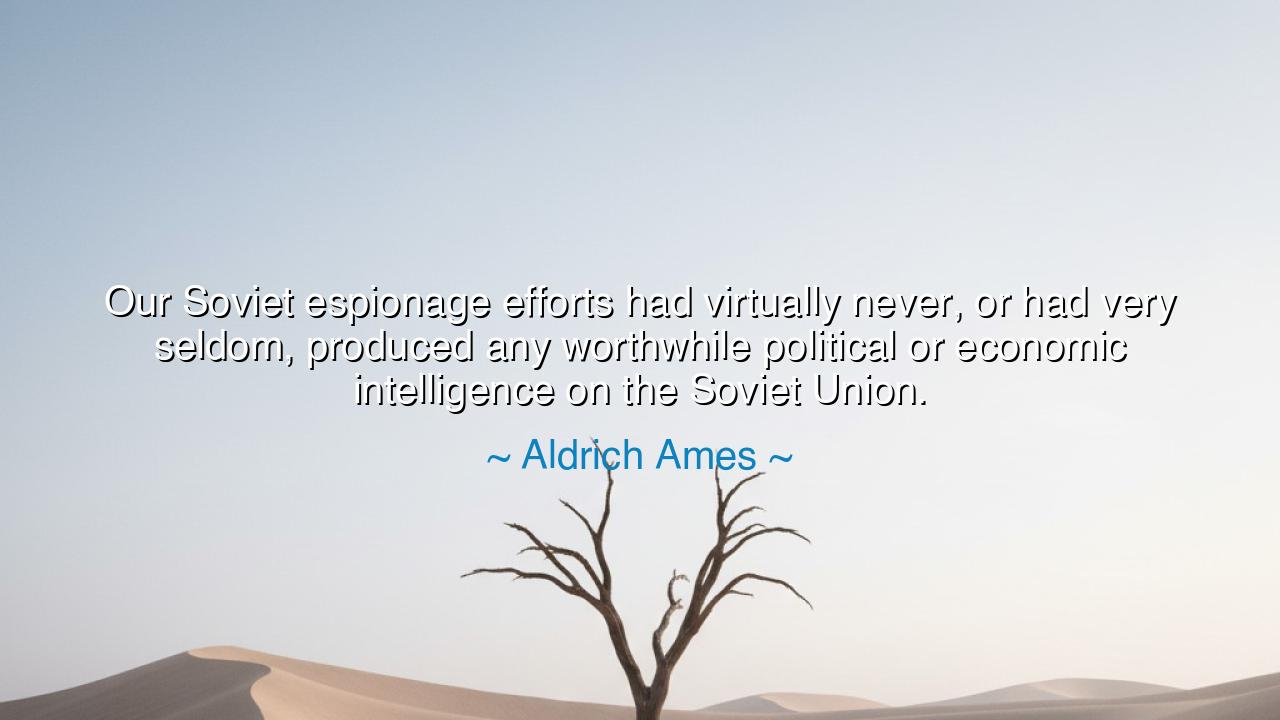
Our Soviet espionage efforts had virtually never, or had very
Our Soviet espionage efforts had virtually never, or had very seldom, produced any worthwhile political or economic intelligence on the Soviet Union.






“Our Soviet espionage efforts had virtually never, or had very seldom, produced any worthwhile political or economic intelligence on the Soviet Union.” Thus spoke Aldrich Ames, a man both participant and betrayer in the secret wars of his age — a spy whose life became a parable of deception, disillusionment, and revelation. His words, stripped of illusion, are both confession and indictment. In them, one hears not merely the frustration of an operative, but the weary wisdom of one who has seen the limits of intelligence, the frailty of knowledge, and the emptiness of great powers when truth eludes their grasp.
To understand the depth of this statement, we must recall the long shadow of the Cold War, when the world stood divided between two titans — the United States and the Soviet Union — each consumed by fear of the other’s power. Espionage, the craft of hidden eyes and silent tongues, became the chosen weapon in this invisible war. Men risked their lives to uncover the secrets of economies, governments, and ideologies. Yet, as Ames revealed, for all the billions spent, for all the lives devoted to infiltration, the results were meager, fleeting, and often hollow. The greatest powers on earth, armed with the finest tools of surveillance, remained blind to the inner truth of their enemies.
What Ames admitted, perhaps unwillingly, is that knowledge without understanding is barren. The spies of the West gathered data — reports, rumors, intercepted words — yet they failed to grasp the true pulse of the Soviet heart. They could not see the weariness of its people, the stagnation of its system, the quiet erosion of faith within its own citizens. When the Soviet Union finally collapsed, it was not by missile or invasion, but by the slow crumbling of belief — a decay that no satellite or cipher could detect. In this, Ames’s quote becomes not merely a critique of espionage, but a reflection on the limits of human perception.
History abounds with such blindness. Consider the fall of Troy, when the Greeks, unable to pierce the walls by force, resorted to cunning. The Trojans, in their pride, mistook deceit for gift and welcomed the Wooden Horse within their gates — and thus destroyed themselves. Intelligence without insight led to ruin. So too, in the Cold War, both East and West mistook information for wisdom. They saw numbers but not souls, movements of armies but not the movements of history. Ames’s lament, though born of treachery, exposes the tragic truth that even the most powerful nations can be ignorant in their knowledge and blind in their vision.
The deeper meaning of Ames’s words lies in the moral realm. For in every endeavor — whether of nations, institutions, or individuals — the pursuit of truth must be guided by sincerity and humility. The spies of his world served ideology, not understanding; they sought control, not communion. Thus their intelligence yielded little that was “worthwhile.” And so it is in life: when our search for knowledge is tainted by ambition or fear, when we seek to know only to dominate or defend, we find facts but lose truth. The greatest insights come not to the cunning, but to the honest heart that listens deeply, without pretense.
Ames’s own story is a grim mirror of this lesson. In betraying his country to the Soviets, he thought himself master of secret knowledge — yet he became a servant to deceit, blinded by greed and disillusionment. The very system he served failed to grasp the truth about its rival; the very man who trafficked in intelligence understood nothing of loyalty or wisdom. His confession reveals a paradox: those who claim to know most of others often know least of themselves. True intelligence begins not in spying, but in self-knowledge.
Therefore, O listener, let this quote be your guide: do not mistake information for insight, nor cunning for wisdom. Whether in the affairs of nations or in the trials of your own life, seek to understand not merely the surface of things, but their essence. The wise do not gather secrets to wield power; they seek truth to serve peace. Learn from the folly of great empires and the arrogance of spies: knowledge without compassion leads only to emptiness. In your dealings, strive always to see clearly, to listen deeply, and to know truth not as a weapon, but as a path toward understanding.
For as Aldrich Ames, the fallen spy, unwittingly taught, the greatest intelligence is not found in files or reports, but in the mind awakened by humility and the heart illuminated by truth. Only then can knowledge become wisdom, and only then can wisdom become freedom.






AAdministratorAdministrator
Welcome, honored guests. Please leave a comment, we will respond soon